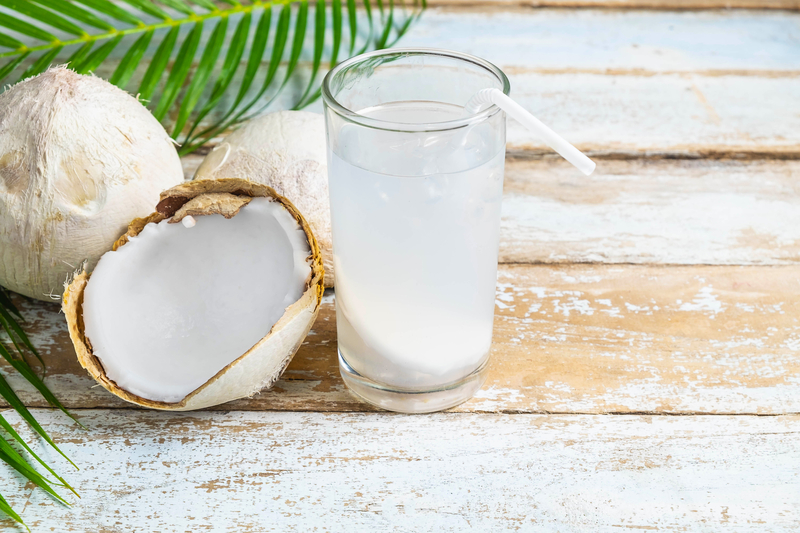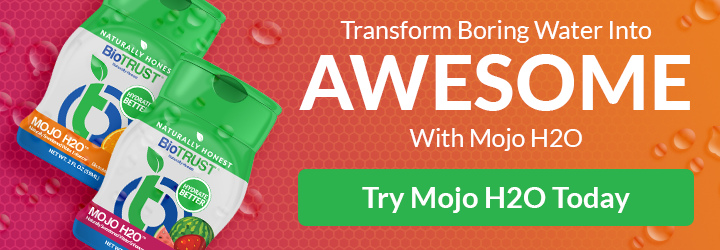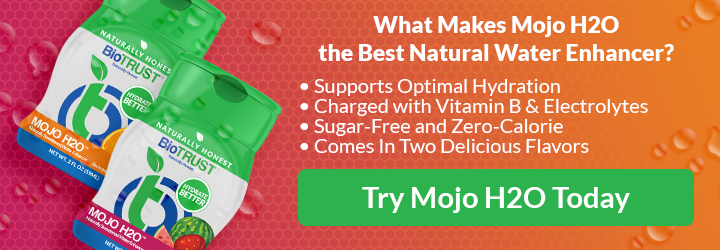Is Coconut Water Good for You? See the Facts

There’s a lot of talk about coconut water, typically accompanied by some pretty big claims of powerful benefits. Beyond coconut water’s ability to take you away with the flavor of a tropical island, is coconut water good for you?
Is Coconut Water Good For You?
Coconut water is the clear liquid collected from whole coconuts. That’s not to be confused with coconut milk, which combines grated coconut with coconut water. Coconut water provides several vitamins and minerals, including:
- potassium (15% of the daily value)
- manganese (15% DV)
- magnesium (4% DV)
- calcium (4%)
- Vitamin C
One reason it’s become popular is that it’s a tasty way to rehydrate without added sugars or artificial ingredients. It isn’t, however, calorie- or sugar-free. One cup of coconut water contains 60 calories, 15 grams of carbs, and 8 grams of natural sugar. Depending on the brand, it may also contain up to 2 grams of protein and up to 2.5 grams of fiber.
It’s recommended for rehydration as it provides an array of electrolytes, including sodium, chloride, and magnesium.
Coconut water is also lower in sugar and calories than many other juices. For example, with a cup of orange juice, you’ll load up with 112 calories and 21 grams of sugar. That doesn’t mean, however, you want to make coconut water your sole beverage of choice throughout the day. If you were trying to use coconut water for all your hydration needs (around 11.5 cups per day), that could add up to 530 calories and 70 grams of sugar. Ouch!
3 Benefits of Coconut Water
There are benefits to consuming coconut water. For example, it:
1. Increase Hydration
Because coconut water is mostly water, it’s a good way to improve hydration. You can also lose electrolytes, especially when working out hard and sweating. Electrolytes are needed for muscle contractions, nerve cell function, as well as fluid balance. 1
Coconut water has been called nature’s sport’s recovery drink, yet only one very small study (with just 12 men, funded by a coconut water company) has shown how effective it can be. In addition, side effects like bloating and stomach discomfort were also found. 2
Right now, there’s minimal evidence that coconut water is any more effective than straight-up water. 3 And unless you’re working out intensely for long periods, or have been sick and are having trouble getting enough fluids, you likely don’t even need extra electrolytes or sugar to help enhance recovery.
2. Provides Needed Nutrients
As previously mentioned, coconut water does provide some additional nutrients. The most notable are magnesium and potassium, but coconut water also provides antioxidants like Vitamin C and caffeic acid. 4
Most of us don’t get enough potassium (or fruits and vegetables in general), so coconut water could be a useful way to increase potassium intake. 5 That said, you could also increase your potassium uptake by eating more fruits and vegetables rich in potassium. These include bananas, citrus fruit, melons, spinach, cooked broccoli, potatoes, zucchini, leafy greens, and others.
Coconut water also provides magnesium and calcium, but those nutrients are also found abundantly in other foods like avocados, nuts and seeds, legumes, leafy greens, and whole grains. It’s a good idea to eat a wide variety of vegetables and fruits to get ample vitamins and minerals rather than focusing on a single food alone for your nutritional needs.
Coconut water could be included in a healthy diet to help fill in nutritional gaps. However, you are likely better off eating whole vegetables and fruits for those nutrients, as they’ll also provide other nutrients and fiber that are too often missing from our diets.
3. Provides Health Benefits
Because coconut water provides antioxidants and other nutrients, there’s been some hype that it can help fight various diseases, such as high blood pressure and heart disease. Unfortunately, there’s little evidence so far that coconut water lives up to those claims.
And the studies that do indicate healthy benefits are typically done with animals (rather than humans). For example:
- When given coconut water, male rats fed a high fructose diet experienced decreased oxidative stress, blood pressure, and triglycerides. 6
- Rats fed a high-fat diet saw improved lipid profiles and liver antioxidant enzymes when fed coconut water. 7
- Diabetic rats fed coconut water experienced decreased blood sugar and diabetic retinal damage. 8
- Rats with kidney stones experienced decreased crystals in the kidneys and urinary tract when given coconut water. 9
Further human studies are needed to determine if these are also potential benefits for humans.
LIMITED TIME OFFER: Get Ageless Turmeric, Our Highly-Bioavailable Turmeric & Ginger Supplement, As Low As $14
Do You Need Coconut Water?
Despite all the hype, there’s no evidence that coconut water is more special than other hydration options available. And in fact, others may pack more of a punch. If you enjoy it after a long bike ride, run, or hike, then it can fit nicely into a healthy diet. On the other hand, if you’ve just had a quick 30-minute workout, afternoon walk, or morning jog, then you likely don’t need anything more than water—at least for ensuring you are rehydrated.
Remember too that coconut water is neither sugar-, carb-, nor calorie-free. And because it contains sugar, it could also raise blood sugar, especially if consumed without other foods. (Remember to look for brands that provide just coconut water, and avoid those with added flavors and sweeteners.)
Are There Better Options Than Coconut Water?
One of the best drinks for rehydrating is plain ole H2O. If you are looking for something a little more flavorful, you can always add sliced fruits, vegetables, or herbs.
You can also choose a quality water enhancer that provides additional flavor as well as electrolytes and B vitamins. We love Mojo H2O™, which comes in two delicious flavors: Strawberry Watermelon and Mandarin Orange.
If you’re seeking extra energy without added sugars and the typical energy crash, then a red superfoods powder like Eternal Reds™ is a great option. Eternal Reds provides energizing polyphenols and healthful antioxidants from beets, apples, pomegranates, grapes, cranberries, blackberries, raspberries, and strawberries. Plus, it tastes so yummy!
Another refreshing drink is a quality super greens powder. MetaboGreens provides over 40 phytonutrient-rich fruits, vegetables, and herbs to help support energy, antioxidant status, and optimize health.
If you enjoy the flavor or just want something different for a change of pace, then coconut water can fit the bill, especially when it’s consumed along with other hydrating drinks like water. Just don’t expect it to be some magic elixir that’s going to solve all your hydration woos.







